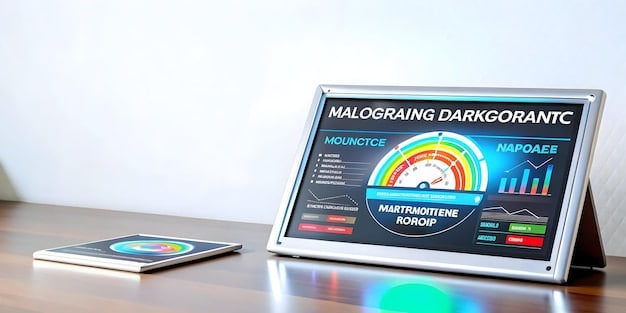AI Project Management: Cut Overruns by 15% with AI

AI-powered project management offers a transformative approach to reducing project overruns, leveraging machine learning and data analysis to enhance planning, resource allocation, and risk management, potentially cutting overruns by 15% in the next quarter.
In today’s fast-paced business environment, project overruns are a significant concern for organizations across various industries. The traditional project management methods often fall short in predicting and mitigating potential risks, leading to budget escalations and missed deadlines. AI-powered project management: reduce project overruns by 15% in the next quarter is becoming a viable solution.
Understanding AI in Project Management
Artificial intelligence (AI) is transforming how projects are managed, offering tools to analyze data, predict outcomes, and automate tasks. This technology is poised to revolutionize project management by improving efficiency and accuracy.
AI brings a wide range of benefits to project management, enhancing various aspects of the project lifecycle. By automating routine tasks, improving decision-making, and predicting potential problems, AI helps project managers streamline their workflows and achieve better results.
How AI Enhances Project Management
AI provides project managers with enhanced tools for planning, execution, and monitoring. Its ability to process and analyze large datasets swiftly offers actionable insights that can dramatically improve project outcomes.
- Predictive Analytics: AI algorithms can analyze historical data to predict potential delays, budget overruns, and resource bottlenecks.
- Automated Task Management: Routine tasks such as scheduling and report generation can be automated, freeing up project managers to focus on strategic activities.
- Risk Assessment: AI can identify and assess project risks more accurately than traditional methods, allowing for proactive mitigation strategies.

Ultimately, the integration of AI in project management leads to a more efficient, data-driven, and proactive approach, minimizing risks and maximizing the chances of project success.
Key Benefits of AI-Powered Project Management
AI-powered project management offers a multitude of benefits, ranging from improved accuracy and efficiency to enhanced decision-making and risk management. These advantages contribute to better project outcomes and increased organizational success.
By leveraging AI, project managers can make more informed decisions, optimize resource allocation, and predict potential problems before they occur. Some key benefits include:
Improved Accuracy and Efficiency
AI algorithms can process vast amounts of data and identify patterns that humans might miss, leading to more accurate project planning and execution. Automation further streamlines processes, reducing the time spent on routine tasks.
Enhanced Decision-Making
AI provides project managers with real-time insights and predictive analytics, enabling them to make data-driven decisions. This reduces the reliance on guesswork and intuition, leading to better outcomes.
- Real-Time Data Analysis: AI tools monitor project progress and provide instant feedback, allowing for immediate adjustments.
- Data-Driven Insights: AI generates actionable insights from project data, enabling informed decision-making processes.
- Predictive Modeling: AI algorithms can forecast project outcomes, helping managers anticipate and mitigate potential problems.
The benefits of using AI in project management are clear: improved accuracy, increased efficiency, and better decision-making. By adopting these technologies, organizations can significantly enhance their project success rates.
Implementing AI in Your Project Management Strategy
Implementing AI in project management requires a strategic approach. To successfully adopt these technologies, organizations must begin with a clear understanding of the AI tools available and a well-defined implementation plan.
A thoughtful strategy ensures that AI integration enhances existing processes rather than disrupting them. Here are some key steps to consider:

Choosing the Right AI Tools
Selecting the right AI tools depends on the specific needs and goals of your projects. Some tools are designed for task automation, while others focus on predictive analytics or risk management.
Integrating AI with Existing Systems
Integrating AI tools with your current project management systems is crucial for seamless operation. Compatibility and data sharing are important factors to consider.
- Assess Project Needs: Identify specific areas where AI can provide the most benefit, such as risk management or task automation.
- Choose Compatible Tools: Ensure that the AI tools you choose integrate with your existing project management software.
- Train Your Team: Provide comprehensive training to your team to ensure they can effectively use the new AI tools.
Putting AI into action demands planning and execution. By carefully choosing the right tools and integrating them with existing systems, organizations can harness the power of AI to improve project outcomes.
Overcoming Challenges in AI Adoption
While the benefits of AI in project management are substantial, organizations may face challenges during adoption. Overcoming these hurdles requires careful planning, training, and a willingness to adapt existing processes.
Common challenges include resistance to change, data privacy concerns, and the need for specialized skills. By addressing these issues proactively, organizations can ensure a smooth and successful transition.
Addressing Resistance to Change
One of the biggest challenges is overcoming resistance to change from team members who are accustomed to traditional project management methods. Clear communication and demonstration of AI’s benefits can help ease this transition.
Ensuring Data Privacy and Security
Data privacy and security are paramount when using AI, particularly in industries with strict regulatory requirements. Organizations must implement robust data protection measures to safeguard sensitive information.
Addressing the challenges of AI adoption requires preparation, clear communication, and robust data protection measures. By proactively tackling these issues, organizations can successfully integrate AI into their project management practices.
Measuring the Impact of AI on Project Overruns
Measuring the impact of AI adoption on project overruns is essential for justifying the investment and demonstrating the technology’s value. Organizations should track key metrics before and after implementing AI to assess the true extent of the benefits.
Key performance indicators (KPIs) such as budget adherence, project completion time, and resource utilization provide valuable insights into AI’s effectiveness. Continuous monitoring and analysis of these metrics are crucial for ongoing improvement.
Key Performance Indicators (KPIs)
Identifying relevant KPIs is the first step in measuring AI’s impact. These metrics should align with the organization’s strategic goals and reflect the specific areas where AI is expected to make a difference.
Before implementing AI, establish baseline metrics for each KPI. This provides a point of reference against which to measure subsequent improvements.
- Budget Adherence: Track the percentage of projects completed within the allocated budget.
- Project Completion Time: Monitor the average time taken to complete projects.
- Resource Utilization: Measure how efficiently resources are allocated and utilized across projects.
Measuring AI’s impact on project overruns demands clear KPIs and consistent monitoring. By tracking key metrics before and after implementing AI, organizations can accurately assess the technology’s value and make data-driven decisions for continuous improvement.
The Future of AI in Project Management
The future of AI in project management is promising, with ongoing advancements expected to further enhance its capabilities. Emerging trends such as machine learning and robotic process automation (RPA) are set to play a significant role in shaping the next generation of AI-powered project management tools.
The integration of these technologies will lead to more autonomous project management systems that can self-optimize and adapt to changing conditions. As AI becomes more sophisticated, project managers will increasingly rely on its insights to drive success.
Emerging Trends in AI
Staying abreast of emerging trends in AI is crucial for project managers who want to leverage the technology’s full potential. Machine learning algorithms that can learn from project data are becoming more sophisticated.
Robotic process automation (RPA) is automating routine tasks that previously required manual intervention. This frees up project managers to focus on more strategic activities, such as stakeholder management and strategic planning.
The future of AI in project management involves constant innovation and integration. Organizations will need to stay updated with the latest advancements to leverage AI tools effectively.
| Key Point | Brief Description |
|---|---|
| 💡 AI Benefits | Improved accuracy, efficiency, and decision-making in project management. |
| 🤖 Implementation | Strategic planning for AI integration enhances existing processes effectively. |
| 📊 Measuring Impact | KPIs like budget adherence and project completion time are crucial. |
| 🔮 Future Trends | Machine learning and RPA will shape new AI project management tools. |
Frequently Asked Questions
▼
AI algorithms analyze historical project data to identify patterns that indicate potential risks. This allows project managers to take proactive measures.
▼
AI can automate tasks such as scheduling, resource allocation, report generation, and communication, streamlining project management processes.
▼
AI provides real-time insights and predictive analytics, giving project managers the data needed to make informed decisions and optimize project outcomes.
▼
Challenges include resistance to change, data privacy concerns, and the need for specialized skills. Addressing these issues proactively is crucial for successful AI adoption.
▼
Success can be measured by tracking KPIs such as budget adherence, project completion time, and resource utilization before and after AI implementation.
Conclusion
Embracing AI-powered project management represents a forward-thinking strategy to significantly reduce project overruns. By harnessing the power of AI, organizations can enhance efficiency, improve decision-making, and navigate the complexities of modern project management with greater confidence, potentially realizing a 15% reduction in overruns within the next quarter.





